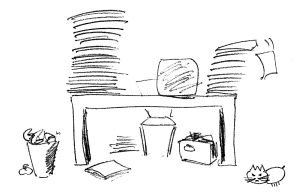Just because a laptop, tablet or printer isn't good for general or intensive use any more doesn't mean it cannot serve any purpose at all. Here are a few suggestions you may wish to consider.
Read MoreBut it might be useful to somebody...
But it might be useful to somebody...
Just because a laptop, tablet or printer isn't good for general or intensive use any more doesn't mean it cannot serve any purpose at all. Here are a few suggestions you may wish to consider.
Read MoreI wonder what 'visionary' came up with the concept of the paperless office? This is an idea that could have been born only in the days before personal computer technology was ubiquitous, at a time when it was peripheral to our everyday lives.
 Paperless office?Quite apart from our natural tendency to prefer something tangible to something which, in a physical sense, seems not to exist at all, we are just not designed to do lots of reading on a screen. Eye strain and other computer-related ailments are all too easily acquired when people try to achieve what is, when all said and done, impossible.
Paperless office?Quite apart from our natural tendency to prefer something tangible to something which, in a physical sense, seems not to exist at all, we are just not designed to do lots of reading on a screen. Eye strain and other computer-related ailments are all too easily acquired when people try to achieve what is, when all said and done, impossible.
Reading on a screen is a different experience to reading on paper. That's why several studies have shown that people skim text on screens more than they do text in print,and why a whole industry has grown up advising people how to write specifically for the web. (A good summary may be found here: http://www.paperhat.net/articles/how_do_people_read_on_screen/.) It will be interesting to see whether the same reading limitations will hold true, in the long run, for ebook readers, even the ones whose screens purport to emulate paper.
Yet every so often I visit a school which prides itself on having a virtually paperless environment. I find that hard to believe, but more importantly, as it's such a difficult goal to attain, why not be pragmatic and adopt the green lobby's mantra of 'reduce, re-use, recycle' as their motto?
Here in the Freedman household we strive to abide by these principles. We reduce our use of paper by only printing out stuff when it's absolutely necessary, and then using both sides of the paper when we do.
We re-use the paper by using the blank side, when there is one, for things like shopping lists and telephone messages. We have attempted to re-use paper by putting it back in the printer's paper tray.
The trouble with this though is that at least fifty percent of the time it screws the paper up, which results not only in wasted time but in even more paper being used. But worse still is the embarrassment of turning up at a meeting with a sensible breakdown of costs on one side of a sheet of paper, and some political blogger's rant on the other. It hasn't actually happened to me yet, but give it time.
More often than not, I forget or don't realise that there is used paper in the printer. I set it to print a 30 page report while I go off and pummell a cat (everybody needs a hobby), only to return to a completely useless stack of paper, and the need to use even more.
We're especially good at the recycling bit. We shred a lot of our paper in order to safeguard ourselves against identity theft. The shreddings find their way either into the cats' litter tray, or to our compost heap. The rest goes into a recycling box which is collected once a week.
Of course, the road to hell is paved with good intentions, and one must always be alert to the possibility of unintended consequences. Like the time I set out recycling sacks in the computer suites in order to encourage the pupils to put discarded print-outs in them rather than the waste paper baskets. The volume of printing increased dramatically overnight, which I could only summise was due to the fact that the pupils thought it no longer mattered since they would recycle unwanted results. I was right: as soon as I removed the bags, from the pupils' sight at least, printing returned to its normal level.
I'd be interested in hearing your views on all this. Do you strive towards being completely paperless, for instance? What do you do?
(c) Terry Freedman All Rights Reserved